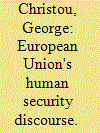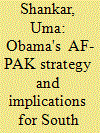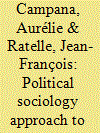| Srl | Item |
| 1 |
ID:
131636


|
|
|
|
|
| Publication |
2014.
|
| Summary/Abstract |
The language of human security has been prominent in the European Union's (EU) official discourse for a number of years. However, whilst it has been promoted as a new approach for the EU in the development of its security and defence policy, the aim of this article is to assess the extent to which it actually features in the EU's contemporary strategic discourse and practice. It seeks to uncover where and how the concept is spoken within the EU's institutional milieu, how it is understood by the relevant policy-makers in the EU and the implication of this across key areas of human security practice. It is argued in the article that human security has not been embedded as the driving strategic concept for Common Security and Defence Policy (CSDP) in an era of crisis and change in Europe and beyond and that the prospects for this materialising in the near future are rather thin.
|
|
|
|
|
|
|
|
|
|
|
|
|
|
|
|
| 2 |
ID:
128386


|
|
|
|
|
| Publication |
2011.
|
| Summary/Abstract |
The Af-Pal< strategy of Obama Administration marks a distinct stage in the evolution of the US policy towards Afghanistan since Septemberl 1, 2001. It draws upon the inadequacies of the Afghan policy of the Bush Administration which apparently believed in the rhetoric of war against terror but did not adopt effective strategy with well defined priorities. 'The Bush Administration's objectives were threefold: defeat of Al Qaeda, destruction of the Taliban supportbase and blind determination to bring democracy to Afghanistan and the wider Muslin world. Beyond these general aspirations, the US government during the Presidency of George Bush, never had an Afghanistan or Pakistan strategy let alone an At'-Pal: strategy'.' Pakistan's covert support to Taliban leading to its resurgence and the inability of the US forces in hunting down Al Qaeda and the Taliban were causing uneasiness in the minds of the US leaders. Yet George Bush did not take any substantial initiatives in order to match anti-terror rhetoric. He was not prepared to review the traditional 'perception of the United States towards Pakistan, whose military regime had, as a matter of convenience, suddenly turned into the US ally against terror.
|
|
|
|
|
|
|
|
|
|
|
|
|
|
|
|
| 3 |
ID:
132213


|
|
|
|
|
| Publication |
2014.
|
| Summary/Abstract |
This article seeks to foster a better understanding of the diffusion of conflict in the North Caucasus. We argue that diffusion of conflict is a dynamic and adaptive process in which outcomes are shaped by the intersection of three social mechanisms-attribution of similarity, brokerage, and outbidding-and the political, social, and religious contexts. We suggest that a distinction should be made between horizontal and vertical processes of diffusion. We also approach the empirical diffusion of conflict from a different perspective, showing that non-Chechen actors have played a key role in both the diffusion process and its outcomes.
|
|
|
|
|
|
|
|
|
|
|
|
|
|
|
|